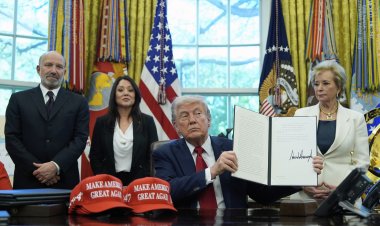‘We will make his life miserable’: GOP promises bruising confirmation for Pentagon policy pick
The White House plans to renominate three top civilians in the new year after the Senate failed to take action.


President Joe Biden plans to renominate his pick to be the Pentagon's policy chief, a move sure to trigger fresh fights with Republicans over the administration’s withdrawal from Afghanistan and contentious abortion policies.
Derek Chollet, who had a bruising confirmation hearing in September after he was originally tapped for the job, was one of three nominees for top Pentagon appointments who spent months in limbo in the Senate awaiting confirmation.
After the chamber sent the nominees back to the White House on Wednesday, which is standard procedure if the Senate fails to act before the end of the year, it was up to the White House to decide if it wanted to renominate them in the new year or pick someone else for the jobs.
“President Biden intends to renominate these extremely well-qualified individuals,” National Security Council spokesman Sean Savett said Thursday in an email.
Chollet is by far the most contentious. But the other two picks — Ronald Keohane, tapped to be assistant secretary for manpower and reserve affairs, and Melissa Dalton, the pick for the Air Force’s No. 2 civilian — face an uphill battle once Congress returns in January.
The commitment comes as a narrowly divided Senate that has confirmed just one civilian DOD nominee since April. That fight is unlikely to get easier in the new year.
Chollet, who weeks after his Senate Armed Services hearing hasn’t yet been voted out of committee, faces resistance from Republicans who are protesting the Pentagon’s abortion travel policy and other Biden administration decisions.
Two senior members of the committee, Sens. Joni Ernst (R-Iowa) and Dan Sullivan (R-Alaska), have said in recent days that they plan to obstruct Chollet's nomination, and Senate Armed Services Chair Jack Reed (D-R.I.) has acknowledged the confirmation faces a tough path.
“I’m not in favor of [Chollet], and unless he comes to the committee and tells us Republicans he’s going to do something about the DOD abortion policy, I won’t be supporting him — and I’ll do everything I can to kill him,” Ernst said in a brief interview this month.
She was referring to the Pentagon’s policy of reimbursing troops who travel to obtain abortions. DOD has not budged on the decision, despite the monthslong hold on military nominees by Sen. Tommy Tuberville (R-Ala.).
“We will make his life miserable, because this is an important issue for us that has been rejected outright by this administration,” she added.
Chollet, a high-level State Department counselor, faced tense questions from Republicans during his Senate Armed Services hearing, including from Sullivan, over the role he played in the Afghanistan evacuation and other Biden administration decisions.
Chollet was picked to replace Colin Kahl as the top official advising the Pentagon chief on all matters related to policymaking. Kahl was one of Biden’s most controversial nominees, and only barely scraped through confirmation after facing sharp questions over his harsh criticism of Republicans on social media and support for the 2015 Iran nuclear deal.
Personnel policy, including the one on abortion travel, would not actually fall under Chollet’s purview. That’s overseen by the undersecretary for personnel and readiness — a job that Ashish Vazirani has filled on an acting basis since Gil Cisneros left in September to run for Congress again.
Chollet’s not the only nominee facing headwinds. Sen. Ted Budd (R-N.C.), an Armed Services Committee member, has placed a hold on Keohane to pressure Defense Secretary Lloyd Austin to drop the abortion travel policy.
“As Senator Budd stated on the Senate floor last week, he’s been clear with the Pentagon since day one that he would be happy to lift his hold on Ronald Keohane should Secretary Austin rescind the Department’s abortion travel policy,” Budd spokesperson Mike Reynard said in a statement.
Keohane, who was approved by the Armed Services Committee in March and was awaiting a Senate confirmation vote when Congress adjourned for the year, faces GOP resistance over personnel policies they contend are a distraction from the military’s mission.
Keohane was peppered with questions by Republican senators about DOD’s extremism stand-down, recruitment challenges, efforts to promote diversity and inclusion in the ranks and discharges of troops who refused to get the Covid vaccine.
Next on the list is Dalton, who Biden nominated as undersecretary of the Air Force in September. The Armed Services Committee, busy with the annual defense policy bill, has yet to hold a confirmation hearing for her.
Dalton in her current role as DOD’s assistant secretary for homeland defense and hemispheric affairs leads one of the Pentagon’s most politically charged portfolios because of the controversies surrounding the Biden administration’s border and immigration policies.
And Senate Armed Services ranking member Roger Wicker (R-Miss.) and fellow Republicans have a record of accusing Dalton of being less than transparent with them, which foreshadows tough questions when the committee holds a confirmation hearing for her.
Wicker, who has spearheaded a monthslong campaign to halt DOD’s sale of unused border wall construction materials, led a letter in August that was signed by every Republican on the Armed Services Committee.
They called on the Defense Department Inspector General to investigate Dalton’s, “failure to provide Congress accurate and timely information about the Department’s plans regarding the use of these border wall construction materials, despite multiple inquiries about the border wall construction materials from both Senate Armed Services Committee members and staff.”
Lara Seligman contributed to this report.












